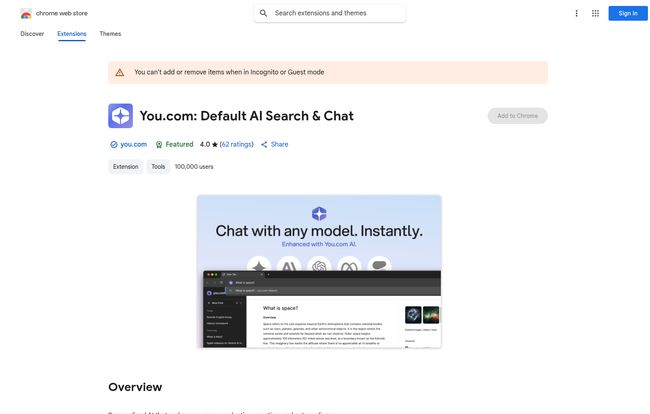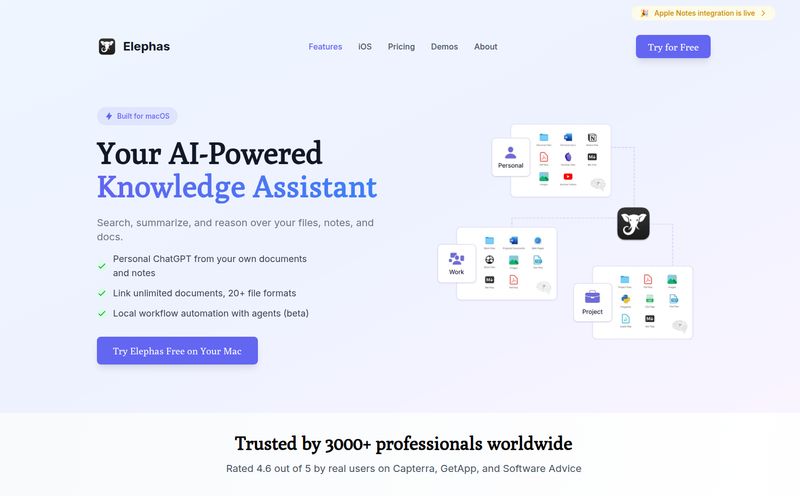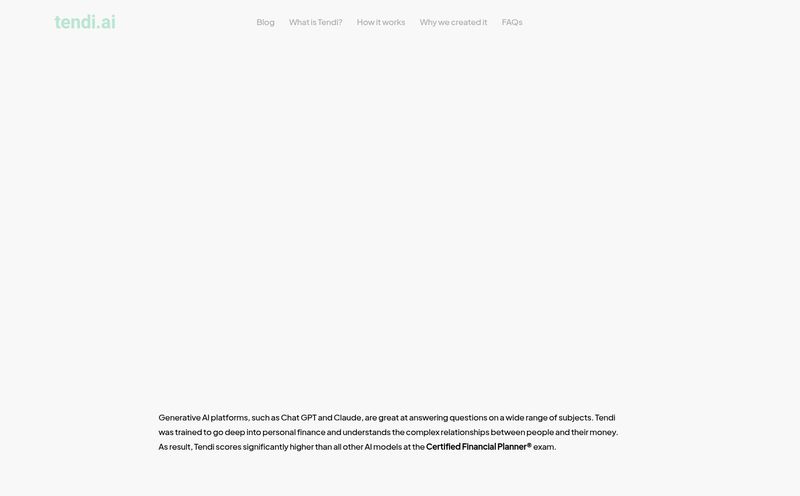For years, the world of search has been a one-horse town. We all know its name. And as an SEO pro who’s spent more time than I'd care to admit analyzing SERPs, I've seen it get… cluttered. More ads, more sponsored content, and less of the straight-up answers we're actually looking for. It's felt like we were due for a shake-up.
Then the AI boom happened. Suddenly, new tools are popping up everywhere, promising to change how we do everything. And right in the middle of it all is You.com. It's not just another search engine; it's billing itself as an AI assistant, a conversational partner that prioritizes privacy. I’ve been hearing the chatter, so I decided to roll up my sleeves, install the Chrome extension, and really put it through its paces. Is it just hype, or is this the shift we've been looking for?
So, What Exactly Is You.com?
Imagine if Google's search bar and a really smart AI like ChatGPT got together. Their offspring would be something like You.com. It's a search engine at its core, but it doesn't just throw a list of blue links at you and call it a day. Instead, it tries to understand what you want and gives you a comprehensive answer, often in a conversational format, pulling from web results but also generating a summarized response with its built-in AI. It’s designed to be a tool for doing, not just for finding.
The big promise here is a more personalized and private way to get information. They’re pretty loud about not selling your data, which, in 2024, is a massive selling point. For someone who's constantly researching sensitive client data or just tired of my search for a new coffee maker following me around the internet for weeks, this is music to my ears.
My First Impressions of the You.com AI Search Experience
Okay, so firing up You.com for the first time is… clean. The interface is modern and less chaotic than what I'm used to. You type in a query, and instead of just a wall of text and ads, the page is organized into sections. You get a direct AI-generated answer at the top, followed by traditional web links, images, videos, and even results from specific apps like Reddit or Stack Overflow, which you can upvote or downvote to customize your future results.
This user control is pretty neat. It feels like you’re teaching the engine what you find helpful, rather than just being a passive consumer of an algorithm's best guess. I threw a few queries at it, from simple stuff like “best pizza in Chicago” to more complex SEO questions about programmatic SEO workflows. The immediate, summarized answers were surprisingly good. It’s a different flow. You get the gist instantly, then you can dig into the linked sources if you need more depth.

Visit You.com
It changes the whole dynamic from 'searching' to 'asking.' It's a subtle but powerful shift.
The AI Toolkit That Comes Along For the Ride
You.com isn't just one-trick pony. It comes packed with a few extra AI tools that make it more of a productivity hub. This is where it starts to get really interesting for professionals and creatives.
The AI Chat Is The Star of the Show
This is the main event. The chat functionality is powered by some of the biggest names in the AI space—we're talking OpenAI's GPT-4, Anthropic's Claude 3.5, and Meta's Llama 3. Having access to these different models is a huge plus. It means you're getting some of the highest-quality responses available. I’ve always felt that the quality of an AI tool lives and dies by the model its running on, and You.com didn’t cheap out here.
The answers are comprehensive, nuanced, and feel less like a robot spitting out facts. I asked it to draft an email to a client explaining a drop in rankings due to a recent Google update, and the result was empathetic, professional, and required very little editing. That saves me real, actual time.
YouWrite and YouImagine: The Creative Corner
Tucked inside are also AI writing and image generation tools. YouWrite can help you draft articles, social media posts, emails, you name it. It's handy for breaking through writer's block or just getting a first draft on the page. YouImagine generates AI images from text prompts. Are they going to replace dedicated platforms like Midjourney or Jasper? Probably not. The quality, especially on the free plan, is good for quick mockups or a simple blog header, but it's not neccessarily going to win any art awards. Still, having these tools baked right into your search engine is incredibly convenient.
Let's Talk About Privacy For a Second
This is a big one for me. As an SEO, I handle a lot of client information and do a ton of market research. The idea that my every query is being logged, packaged, and sold is unsettling. You.com's privacy policy, as stated in their Chrome Web Store listing, is clear: they don't sell your data to third parties. They also state it’s not used for things like determining creditworthiness. This commitment to a more private web experience is a significant differentiator. It's a return to the idea of the internet as a tool for the user, not a tool for advertisers. A novel concept, I know.
The Price of Power: Understanding the YouPro Subscription
Of course, all this advanced AI doesn't come for free. While there’s a very functional free version of You.com, the real power is unlocked with their paid plan, YouPro. Here's a quick breakdown:
| Plan | Price | Key Features |
|---|---|---|
| YouPro | $9.99 / month | Unlimited chat with GPT-4, faster and photorealistic AI image generation, priority uptime, early access to new models & APIs. |
So, is it worth ten bucks a month? My take: it depends entirely on your usage. If you are a writer, developer, student, or researcher who would otherwise be paying for a ChatGPT Plus or Claude Pro subscription, then yes. It's very competitive. You get top-tier AI chat integrated directly into a search workflow. For the casual user who just wants to ask a few questions a day, the free version is more than enough to get a taste of what AI search can do.
The Downsides, Because Nothing's Perfect
I wouldn't be giving you an honest review if I didn't mention the drawbacks. First, to get the best experience and access GPT-4, you need to sign in. It’s a small friction point, but it's there. Second, as we just discussed, many of the most powerful features are behind the YouPro paywall. That's just the reality of the freemium model.
There's also the larger, more philosophical argument that relying too much on AI for answers can dull our critical thinking skills. I see the point, but I disagree with the premise. I view these tools as powerful levers. You still need to know where to place the lever and how to pull it. The AI gives you a well-researched summary, but it's still on you to check the sources, question the output, and synthesize the information into true knowledge. It’s an assistant, not a replacement for your brain.
How Does It Stack Up Against the Competition?
The obvious comparison is Google. Against Google, You.com wins on privacy and the AI-first experience. It loses on the sheer breadth of integrated features Google has built over decades (like Maps, Flights, etc.). Another close competitor is Perplexity AI. Both are fantastic answer engines. I find Perplexity to be slightly more focused on academic and factual sourcing, while You.com feels more like a complete, user-customizable search replacement. It’s a subtle difference in philosophy, but a noticeable one in practice.
Frequently Asked Questions
- What is You.com?
- You.com is an AI-powered search engine and chatbot that focuses on providing direct, summarized answers and a private, customizable search experience. It integrates powerful AI models like GPT-4 to assist with tasks, writing, and image creation.
- Is You.com free to use?
- Yes, You.com has a robust free tier that offers AI-powered search and limited access to its AI chat and creative tools. For unlimited access to the most advanced features, like GPT-4 chat, there is a paid subscription called YouPro for $9.99/month.
- How does You.com protect my privacy?
- You.com's privacy policy states that it does not sell user data to third-party advertisers. It offers a more private browsing experience compared to traditional search engines that track user behavior for ad targeting.
- Is the YouPro subscription worth the cost?
- If you're a power user who frequently uses AI for writing, research, or coding, the $9.99/month for YouPro is very competitive with other AI subscriptions like ChatGPT Plus. For casual users, the free version is likely sufficient.
- Can You.com completely replace Google?
- For many day-to-day queries and research tasks, yes. Its AI-first approach can be faster and more efficient. However, for deeply integrated services like Google Maps, Flights, and local business discovery, Google still holds a strong advantage.
- What AI models does You.com use?
- You.com leverages several leading large language models (LLMs) to power its chat and search features, including OpenAI's GPT-4, Anthropic's Claude 3.5 Sonnet, and Meta's Llama 3.
Conclusion: So, Should You Make the Switch?
After spending a good chunk of time with it, I’m genuinely impressed. You.com isn't just a novelty. It's a legitimate, powerful, and thoughtfully designed alternative to the way we've been searching for the last two decades. The focus on privacy is a huge win, and the integration of top-tier AI models makes it an incredible productivity tool.
Will it kill Google overnight? No. But it doesn't have to. It offers a different, and in many ways better, path for those of us who want more direct answers and less tracking. My advice? Don't just take my word for it. Install the Chrome extension. Use it for a week. Ask it tough questions. See how it changes your workflow. The future of finding information online is changing fast, and You.com is absolutely at the forefront of that conversation.



